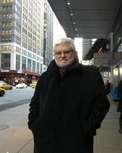 Chris
McDonnell, UK
Chris
McDonnell, UK
chris@mcdonnell83.freeserve.co.uk
Previous articles by Chris
Comments
welcome here
February
15, 2017
Things
fall apart

One
of W B Yeats’ most celebrated poems, ‘The
Second Coming’, has these lines in the opening stanza:
‘…Things fall apart; the centre cannot hold;
Mere anarchy is loosed upon the world,
The blood-dimmed tide is loosed, and everywhere
The ceremony of innocence is drowned;
The best lack all conviction, while the worst
Are full of passionate intensity.’
It
was written in 1919, in the aftermath of the Great War, when the privation
and suffering of that conflict were still vividly fresh in the life
experience of countless millions of people across the torn continent of
Europe
.
There
is something of unremitting despair in that first line, the dissolving of
certainty, the break-up of once cherished options where the furniture of
lives, once secure, has been shattered by circumstance.
The
New Order that was to emerge coloured the pattern of relationships for the
rest of that violent century and continues to do so in our time. Only now,
some of the safeguards and sureties that framed the later 20th
century years have become questionable.
Politically
this is self-evident, with our own country set to leave the EU for we know
not what, turmoil and protectionism rampant in a new
US
administration and numerous conflicts world-wide fed
with the potent fuel of terrorism and bigotry.
Our Church has not escaped the secular storms
that we have all experienced, a fact that should not surprise us for
though we carry the name of ‘Christian’,
we too are part of the huge social movement that has been the soundtrack
of our life time.
It
has been a time of challenging questioning, when asking ‘why?’ or even
‘why not?’ has become acceptable. For some, that has been a matter of
concern, unfamiliar with asking questions, but well-experienced in
receiving answers. I have often said to my grandchildren, ‘ask me any
question you want but don’t always expect a neat and tidy answer’. It
would be foolish to ignore the stress that has been felt in consequence of
this changed culture.
But for others, it has been a liberation, an
opportunity to share, a chance to understand through a deeper
appreciation, an experience of open hands that share, rather than the
semi-closed fist and pointed finger of instruction that tells you how to
think.
We have seen a movement within the Church that, in some ways,
reflects the line of Yeats. ‘Things
fall apart; the centre cannot hold’, but not completely. For our
centre, Christ incarnate, is secure and will always remain. What will
change with each generation, and I would suggest, must change, is the
manner in which we respond to this eternal experience of the loving God.
When the signs of strain are such that cracks
appear in a structure, there are three immediate choices. Ignore the
evidence and trust that all will be sorted, make-do with some sticky tape
until a later, more convenient date, or attend to the issue before there
are more serious consequences.
It is heartening to see the manner in which
Francis has approached difficult and serious issues. Above all, he has
listened, not just to those appointed to high office but also to the poor
and ordinary folk in our
pilgrim
Church
. He has met with the outsider, the one who doesn’t
quite fit the mould, the expected pattern. He has made it clear that he
feels more comfortable with his Christian mission being expressed in this
way than with an ostentatious way of life that we had come to accept in a
hierarchical Church. It is that ‘centre’
that has begun to crumble and which ‘cannot
hold’.
When the centre of something has been so
strong, it is not surprising that ‘that
things fall apart’ when there is change. Each of us in our ‘safety
zone’ feel secure until the challenge comes and we are called to make
our own informed decisions. That’s the time when ‘our
centre’ is truly tested, when we are asked that personal question of
our allegiance to the Risen Lord and not to the ephemeral lifestyle that
it has often been our lot to experience. That is the time of facing a
reality which we cannot ignore.
The example we have been offered, of a Bishop
of Rome who listens to his people, who helps with the reality of their
daily lives, who seeks a relationship of understanding and not one of
misplaced condemnation, is one that should be replicated across the
Church, for he is truly prophetic person.
If only it were so, if only there was such an
acceptance of his wisdom.
The Yeats quote will soon be 100 years old.
The events of the intervening years reflect our inability to learn from
experience. Don’t let’s give up, just yet.
END
---------------
 Chris
McDonnell, UK
Chris
McDonnell, UK Chris
McDonnell, UK
Chris
McDonnell, UK